Tracking devices are now common in many new leisure vehicles, and many caravan and motorhome owners are investing in aftermarket tracking devices to protect their pride and joy.
If your leisure vehicle is stolen, a tracking device can help to find and recover it quickly, and having an approved tracking device can also attract a healthy discount on your caravan or motorhome insurance policy.

In this video, we talk to Laura Wilson at Moving Intelligence about caravan and motorhome tracking devices. We asked her how tracking devices work, the different types of leisure vehicle tracking devices, and the different Thatcham categories. Plus, they answer some common questions about caravan and motorhome tracking devices and the theft recovery process.
Q. What is a tracking device?
A tracking device is installed onto a leisure vehicle and relays its position to an online central portal.
It can be activated in several ways, such as via an alarm, or you can receive an alert if it’s moved out of a certain area that you’ve set. Or you could request a “there and then” position from the tracking device often via an app.
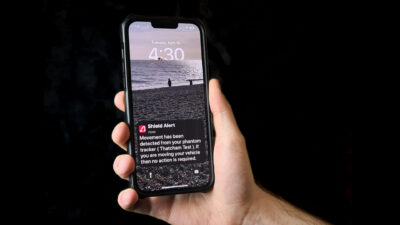
Once you’ve had a tracking device installed you have to pay an ongoing subscription to the tracking device company to gain access to their online portal and services which track your leisure vehicle’s position, as well as its 24-hour contact centre, to help in a recovery after theft. A subscription often also pays for a multi-network SIM card which means the device can transmit its location, time and past movements.
Q. What are the different types of tracking devices?
Tracking device solutions are usually split into two sections – a proactive tracking system and a reactive tracking system.
A reactive tracking system, is one where a customer has to notify their tracking device provider that the caravan or motorhome has been stolen, and then they will react to try find and recover the stolen leisure vehicle.
A proactive tracking system on a caravan would send the end user an alert.
“That alert can be triggered in a number of different ways,” explained Laura. “It could be a movement alert or a tilt alert, or a low battery notification. This alert is sent through to the customer in a proactive way.”
With a motorhome or a campervan Thatcham S5 tracking device an alert would be triggered if a wireless ADR (Automatic Driver Recognition) tag was not present when the vehicle was moved.
“So if, for example, a vehicle is stolen without the tag, an alert is triggered, the customer will get a phone call to say “the tags aren’t present, is everything okay?” and then alerting them of a possible theft or a movement without a tag,” said Laura. “The customer can opt to go one step further, and if the tags aren’t present the vehicle can be immobilised.
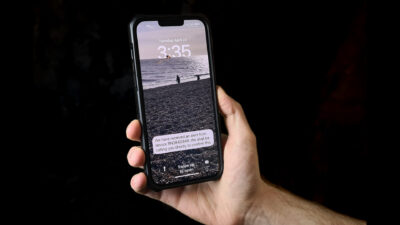
“The benefits of having a proactive system are that you’re notified straight away, as opposed to having to wait. Say if for example, a caravan or a motorhome was in storage, you could be waiting weeks, maybe even months sometimes to find out that your vehicle’s been stolen, whereas with those proactive alerts, you’re notified straight away.”
As well as wired-in proactive and reactive tracking systems, there are also battery-operated tracking devices.
“Battery-operated units are perfect for an after-theft recovery solution,” said Laura. “They can be fitted onto any asset, even those without power.”
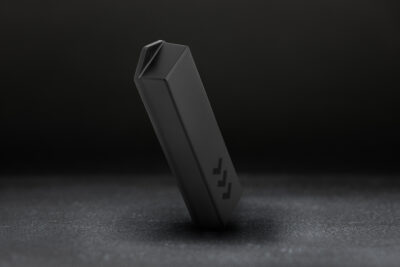
The battery-operated devices from Moving Intelligence work in a ‘wake-sleep’ cycle, dropping in their position once a day and then going back to sleep again.
“Whilst they’re asleep, they’re virtually undetectable to thieves,” said Laura. “But in the event of a theft, we will have sent a message to the unit for it to wake up more frequently, therefore dropping in positions at more frequent time intervals.”
She said the benefit of having a battery-operated device in a leisure vehicle was that they’re wireless, so can be installed in a multitude of different places.
Moving Intelligence also has its Sentinel range, which is a tracking system and an alarm, which are linked together.
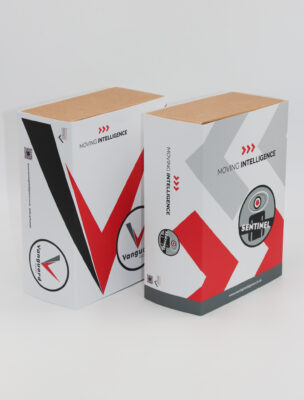
“The benefit of having this is you get more proactive alerts from the alarm system through the tracking portal. So you’ll be alerted if your alarm is activated. So for people who have their leisure vehicles in storage over winter, if their alarm’s activated, they’d be notified of it as opposed to it just going off in a storage yard and them being none-the-wiser.”
What are the different Thatcham categories?
Thatcham will put tracking devices through a rigorous testing process, and then they will be awarded a certain certification at the end of that process.
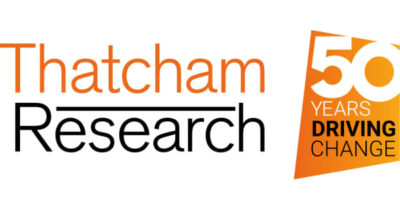
Category S5 and S7 are Thatcham certifications, which provide reassurance around the functionality, design and performance of alarms, immobilisers and tracking systems.
S7 means…
- 24/7 Certified Monitoring Centre
- A minimum of one means of transmission of signal
- Battery back up Power Supply
- Health Check programme
- Means of locating asset within a 1-mile radius in general terrain
- Passively or actively set function
- Precisely locatable within 15 minutes from signal receipt on Thatcham pursuit test
- Remote set function
- Resistance to attack for a minimum of two minutes
S5 means all of the above, plus…
- Battery back up power Supply
- Bi-Directional data transmission
- Data logging
- Driver Identification Device
- Global Positioning System (GPS)
- Passively Set
- Roaming SIM
- Vehicle motion detection
“The main difference between S5 and the S7 is the ADR (Automatic Driver Recognition) tags,” said Laura. “S5 is the ultimate solution with the added benefit of theft prevention.”
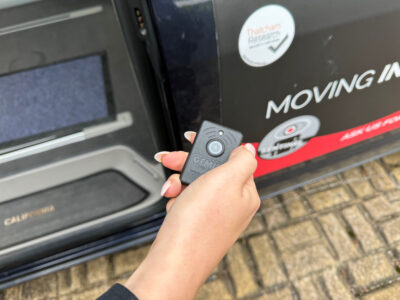
Caravan and motorhome insurance companies will often insist on your tracking device being Thatcham approved for it to qualify for a premium discount. And when it comes to insuring some high-value models of motorhomes, campervans or caravans, it’s possible fitting an approved device will be a condition of cover.
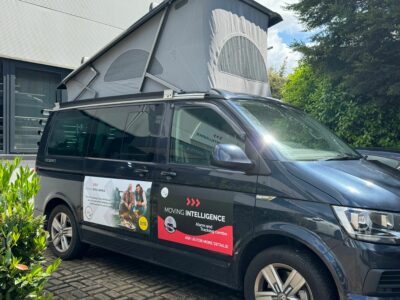
On motorhomes, you might need to fit a Thatcham S7 tracking device or even a more advanced Thatcham S5 device depending on the value of your vehicle.
How does the recovery process work?
Once a customer is aware of a theft, they would then notify the police and gain a crime reference number. From that, they’d then communicate that number with their tracking device company’s call centre who would offer support to both themselves and the police in order to recover their leisure vehicle.
![]()
Depending on the tracking device they’d be able to gain a GPS position. If it’s a wired-in device then this should send details of its position and allow the tracking company to be able to see the movements of the vehicle.
However, if it’s a battery-operated device, it would mean waiting for the next wake-up before they’d be able to gain a position from the unit, which would then be relayed to the police force within the area, who would then help track down and recover the asset that was stolen.
“But we can also send it a message to say “Whilst you’re awake, can you stay awake for a bit longer? And can you start dropping in your positions more frequently,”
How quickly can a device lead to a recovery?
Recovery times vary depending on the type of system that a customer has opted for.
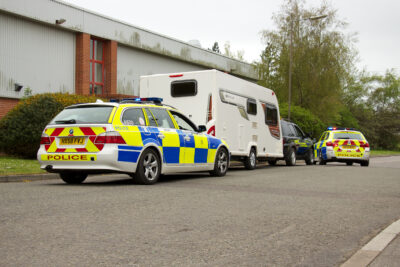
At Moving Intelligence Laura said they had a 94% recovery rate, whereas other vehicles that haven’t had a tracker installed, have a recovery rate of around 10%.
Will a tracking device flatten my battery?
Laura said that the draw their devices have on a leisure battery was minimal and the battery voltage can be monitored via their app. A customer would also get low battery alerts.
“Another thing that a customer could do is to have solar panels installed onto their vehicle, which can help to keep the battery topped up,” added Laura. “Alternatively, they can opt for a second battery-operated tracking device as a back up.”
Do tracking devices work abroad?
Yes, tracking devices should work worldwide, although it is dependent on mobile phone coverage within the area.
Are vehicles recovered?
“Yes. Across the board from both ourselves and other tracking device companies, there’s around a 94%-95% recovery rate, which is why a lot of insurance companies will ask for that Thatcham certification for a tracking device, which is often why they then offer discounts on your insurance premiums.”
What would you say to those people who say they wouldn’t want their caravan or motorhome back after it’s been stolen?
We understand that people don’t want their caravan and motorhome back after it’s been stolen. However, something that we’re noticing is that thieves will take the stolen leisure vehicle to a place to “cool off” to see if there is a tracking device installed onto the vehicle (or not), It’s often left from 24 to 48 hours. During that time we (Moving Intelligence) strike and help with the recovery, often within a matter of hours.
For our gear guide on motorhome tracking devices click here and for more information on caravan tracking devices click here.

Thank you to Moving Intelligence and for more information about their products visit www.movingintelligence.co.uk
(Tracking device insurance discounts are subject to underwriting terms, conditions and minimum premiums. Discounts available at time of article publication in July 2024. We reserve the right to withdraw offers at any time).


I suspect there’s some element of gouging of customer wallets at play in this market. The next mis-selling scandal? My Ford base vehicle has a built-in tracker but I was still under pressure to take a subscription service. On past experience of those I resisted and got a reasonable quote in the end.
Thanks for your comments Gordon. Depending on the value of your motorhome insurers might ask for an approved tracking device – and this needs to be actively monitored by a 24/7 operating centre. That service will likely incur a subscription fee. Some built-in trackers are not Thatcham approved and therefore may not meet our requirements.
All good information but I note no mention of price and I live by the rule if one has to ask the price I don’t want it
We’re sorry we didn’t cover prices but these are listed in our caravan and motorhome tracking device gear guides:
https://www.caravanguard.co.uk/news/guide-to-motorhome-tracking-systems-22024/
https://www.caravanguard.co.uk/news/a-guide-to-caravan-tracking-systems-22256/